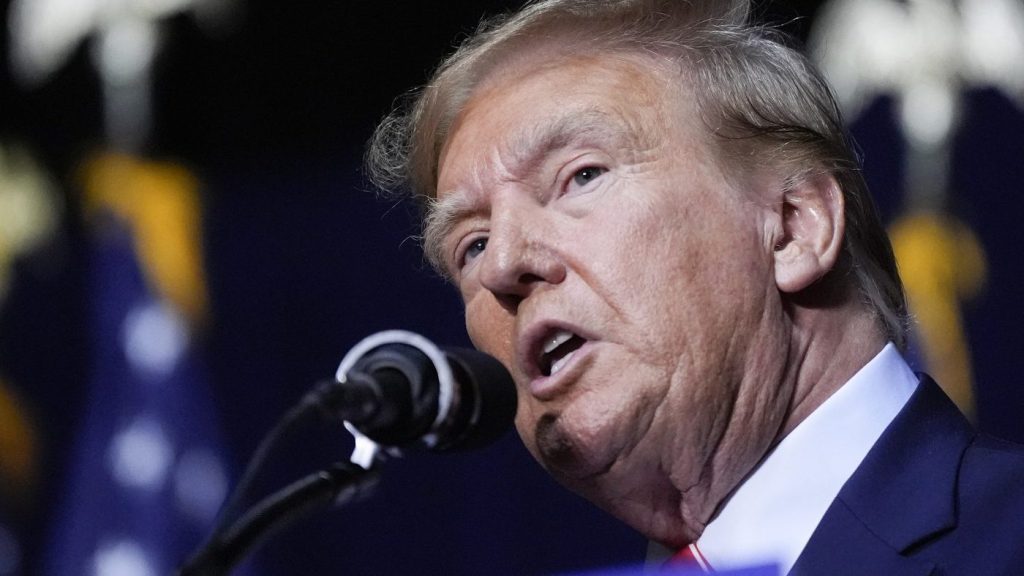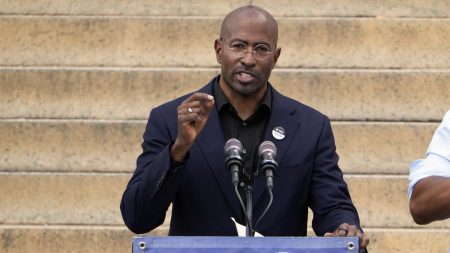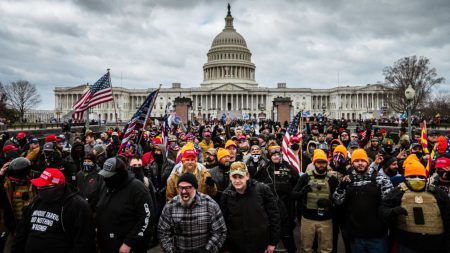A group of advocacy, labor, and civil rights organizations led by Latinas is condemning former President Trump’s increasing use of harsh language against immigrants, arguing that words like his contribute to the provocation of hate crimes.
In a joint statement on Wednesday, the Latina leaders aimed to reject the normalization of language that has become a part of mainstream political discourse, largely due to Trump’s political successes over the past decade.
“Trump’s continuous use of language that diminishes the humanity of immigrants poses a threat to our democracy and to the core of our national identity. This is the same rhetoric that he used to incite a violent mob on January 6 and then recklessly directed them to attack the U.S. Capitol,” said Vanessa Cárdenas, executive director of America’s Voice, a progressive immigration policy group.
“It’s also the same dehumanization of immigrants that has inspired domestic terrorist attacks such as the mass shootings at an El Paso Walmart, Buffalo grocery store, and a Pittsburgh synagogue. We must not become desensitized to the fact that a major presidential candidate relies on lies and dehumanizing immigrants, as well as incitement to violence, as the foundation of his campaign.”
Cárdenas was joined by a prominent group of Latina political leaders, including Lorella Praeli, co-president of Community Change Action; Bruna Sollod, senior political director at United We Dream Action; Kica Matos, president of the NILC Immigrant Justice Fund; Maria Teresa Kumar, president and CEO of Voto Latino; and Rocio Sáenz, executive vice president of SEIU.
The six Latinas were joined by Lindsay Schubiner, director of programs at Western States Strategies, the political arm of the Western States Center, an anti-hate nonprofit.
The seven women issued the joint statement in response to Trump’s speech over the weekend, where he asserted that if he wasn’t elected, “it’s going to be a blood bath for the country,” while discussing the auto industry.
Trump also reiterated his false claims that some countries in the Western Hemisphere are releasing prisoners and mental hospital patients and sending them on the migrant trail.
“I don’t know if you call them ‘people,’ in some cases,” Trump said in Ohio. “They’re not people, in my opinion.”
He also referred to some migrants as “animals.”
“Trump’s repulsive and dehumanizing words against immigrants provide a clear indication of what we can anticipate if he regains power: the extreme and barbaric treatment of immigrants, as well as anyone suspected of being an immigrant,” said Matos.
The Trump campaign is not rejecting the former president’s intention to dehumanize certain categories of immigrants – it’s reaffirming it.
“President Trump was referring to violent illegal criminals, savage murderers like the one who brutally killed Laken Riley, and MS-13 Gang Members – and most Americans would agree that these vicious monsters do not deserve to be humanized,” Trump campaign communications director Steven Cheung told The Hill in an email.
Republicans, driven by Trump, have highlighted Riley’s killing as a political rallying point, using the individual crime to make a case against a broader group of immigrants.
Trump’s readiness to challenge societal norms on immigration language – already the center of his political career – has grown as it’s become clear that border security is President Biden’s most evident political weakness.
“It is shocking that Joe Biden cares more about illegal immigrant criminals than American citizens and spends more time apologizing for calling them illegal than apologizing to Americans for the damage they are causing to our country,” wrote Cheung.
“Biden allows unauthorized individuals to enter our border, uses hardworking Americans’ tax dollars to fly them around the country, and releases them from custody after they commit more crimes. President Trump will secure the southern border and deport illegal criminals to protect ALL American citizens.”
That language – filled with out-of-context claims and sometimes outright lies – is exactly the point, according to the seven women.
“Dehumanizing and violent language is deeply risky — for our communities from El Paso to Pittsburgh to Buffalo, and for our democracy,” said Schubiner, referring to the three bigotry-driven mass murders that collectively claimed 54 lives.
“Trump has led the normalization of bigotry and violence in our politics, but each and every one of our leaders has the responsibility to push back vocally. Trump’s words are a threat to immigrant communities, and they are a threat to the electoral process. We must take him at his word, and take action so that his vision does not become reality.”
The group of advocates holds substantial influence in Latino communities, including some that could prove decisive in November.
“Our members, many of whom are immigrants, work across all sectors of the economy. They’re the essential janitors who clean the buildings we work in, the doctors and nurses who take care of us when we’re sick, and the home care workers who help our aging loved ones and those with disabilities,” said Sáenz, whose SEIU is a key component of voter mobilization efforts in swing states like Nevada.
“Come November, hard working Americans—Black, brown, white, immigrant—will take their demands for good union jobs from the strike lines to the ballot box in 2024 and will do everything in our power to keep Trump and MAGA Republicans from having the last word on who they consider to be ‘people’. We will use our anger and frustration to make real change and elect leaders who will keep all families safe.”
Trump’s opponents are as impassioned by his immigration language as his most fervent supporters.
Democratic political strategists are looking to amplify the dangers behind Trump’s message – though perhaps not the message itself – to energize voters ahead of an election between two unpopular candidates.
“A second term would empower the MAGA right to continue menacing immigrants and migrants even more than what we experienced in his first term,” said Praeli.
“The only way we can stop the fear-mongering is by turning out to vote and choosing the direction we want our country to take. A multiracial democracy is possible – and it’s on us to build it.”
According to Sollod, whose group is the largest organization of young immigrants in the country, a diverse democracy would be in danger if Trump is re-elected.
“We can't afford to lose this country and ourselves to this white nationalist playbook, and we can't accept the racist discrimination, inhumane surveillance, racial profiling, harassment, and detention that our loved ones are facing in places like Texas and Florida,” said Sollod.
“We urge all people and elected officials across the country to oppose these dangerous, white supremacist positions that threaten the lives of immigrants and people of color in this country.”
And Kumar, whose organization is influential in Latino politics, highlighted Trump’s immigration rhetoric as a liability with a wider electorate.
“Americans understand the danger he poses. That's why we defeated him at the ballot box. We rejected his fear-mongering, rage, and chaos. We will do it again. The twice-impeached, four-times indicted former president has no future in our multicultural America,” said Kumar.









